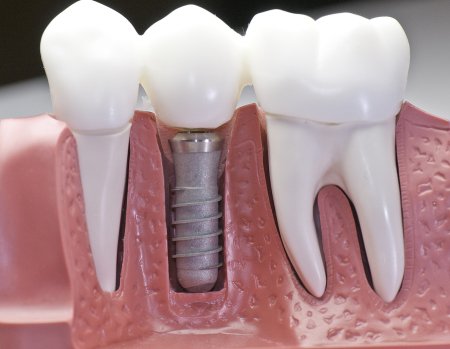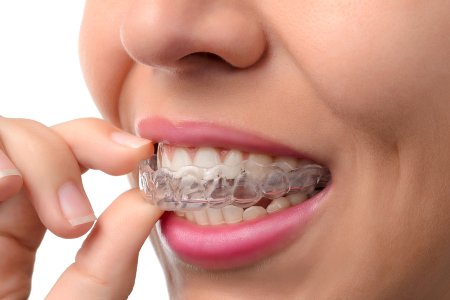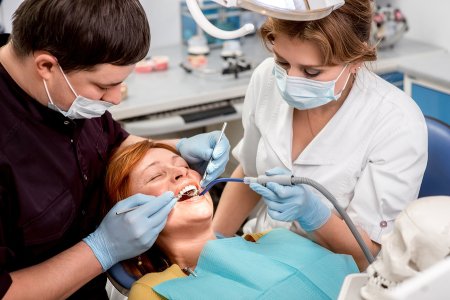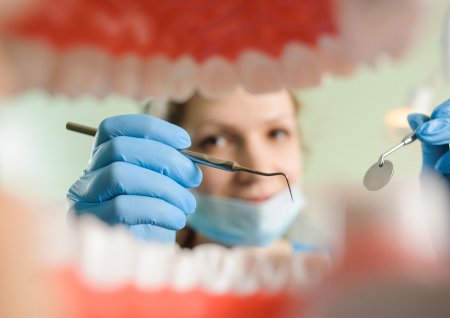-
Learn the Basics of Dental Veneers
If you’re unhappy with the appearance of your teeth, one option your dentist may recommend is veneers. Dental veneers can be used by your cosmetic dentist to correct a number of different complaints, so you can feel confident in your smile.

Veneers are thin shells made of porcelain that are placed on the surfaces of the teeth you wish to be treated. They can be used to correct problems with the shape or size of your teeth, gaps, cracks or other damage, or significant staining that doesn’t adequately respond to whitening treatments. Veneers look natural and can be brushed and flossed as normal, so you don’t have to worry about anything but loving your smile.
If you’d like to find out if veneers could be right for you, make an appointment with a cosmetic dentist near Hazlet at Glenwood Premier Dental today. Call us at (732) 264-4477 to schedule your visit.
-
See How Laser Dentistry Prevents Cross Contamination
As with all medical procedures, cross-contamination is a risk that your dentist works hard to prevent. Even with great attention to detail, however, dental equipment can be difficult to adequately sterilize. Fortunately, thanks to laser dentistry, dental care is safer than ever.
Watch this video to learn more about how laser dentistry can reduce the risk of cross-contamination. Laser energy is bactericidal, and the components of laser dentistry equipment are less likely to harbor bacteria. The tips of the equipment are single-use and disposable, further increasing patient safety.
Glenwood Premier Dental is pleased to offer laser dentistry in Hazlet for our patients’ comfort and safety. To make an appointment with a dentist, please call (732) 264-4477.
-
A Look Back at the History of Dental Implants
The way dental implants are used today for teeth restoration may seem revolutionary, but the history of this treatment is longer than you might think. Take a closer look at the history of implant dentistry here.
Early Implant History
The first known instance of a rudimentary dental implant being is over 4,000 years ago in ancient China. There, bamboo pegs were carved in the shape of teeth and put in the mouth to replace missing teeth. About 3,000 years ago, an Egyptian king used a copper peg to replace a missing tooth, although it is not known if the peg was placed before or after death. Over 2,000 years ago, there is evidence that people used animal teeth and teeth that were taken from the poor and from slaves to create an implant, although this practice likely caused severe infection. Ancient skulls have also been uncovered that appear to show some attempts at tooth replacement using a variety of materials, from shells to jade.
Discovery of the Importance of Osseointegration
In 1886, a breakthrough in implant dentistry occurred, when doctors realized that the reason their patients often rejected in implants is that the implant had to fuse with the bone to be successful. This process is called osseointegration and forms the foundation of modern implant dentistry. In 1952, it was discovered that titanium fused more closely with bone than other metals, and in 1965, the first titanium implant was used in a human patient.

Modern Implant Dentistry
Today, dental implants are considered to be the most natural, effective form of tooth restoration. Titanium posts are used to create the base of the implant, and a crown that is designed to match patients’ natural teeth is used for the top of the implant. No special care or dietary changes are required, which makes implants a favorite with patients over dentures.
If you have missing teeth, let Glenwood Premier Dental help you reclaim your smile with implant dentistry near Hazlet . To schedule a consultation or to learn more about our dental implant services, please call (732) 264-4477.
-
Follow These Dos and Don’ts with Your Invisalign Aligners
Invisalign is an ideal option for getting straighter teeth without the hassles of traditional braces. Patients of all ages love Invisalign because the aligners are virtually invisible and can easily be popped in and out. Your dentist will give you extensive instructions for how to wear your aligners. These dos and don’ts will also help you get the most from your Invisalign treatment.
Do Wear Your Aligners 20-22 Hours Per Day
Because you can take your aligners in and out throughout the day, it’s important to pay attention to the amount of time you’re actually wearing them. Unless you have a specific reason for your aligners to be out, keep them in your mouth. If you wear your aligners for less than 20 hours per day, you could slow down your treatment outcomes, so be mindful about how long you’re wearing your aligners each day.

Don’t Eat with Your Aligners in Your Mouth
It can be tempting to pop a small snack in your mouth while you’re wearing your aligners, but doing so even once can cause damage. The pressure of chewing could cause the aligners to crack or become scratched, in which case they will need to be replaced. Likewise, eating with your aligners in can cause stains that can’t be removed. Every time you want to eat, even if it is just a bite, you’ll need to remove your aligners. Keep in mind that you should also avoid drinks that could cause stains, such as coffee and red wine, while wearing aligners.
Do Clean Your Aligners
Cleaning your aligners on a regular basis will keep them free of stains and debris and protect your oral health. Avoid using regular toothpaste, which is too abrasive for your aligners. Instead, use a cleaning solution recommended by your dentist to keep them in top condition.
Invisalign can restore your confidence in your smile without the need to wear traditional metal braces. At Glenwood Premier Dental , we can help you get started on Invisalign treatment in Hazlet and get you on the track to getting the smile you’ve always wanted. Find out more about Invisalign today by calling (732) 264-4477.
-
What Are Dental Sealants?
Meticulous brushing and flossing are the backbones of preventive dentistry, along with routine check-ups at the dentist’s office. However, it can be challenging to clean well enough to prevent cavities, especially on the tops of the molars. The molars are the teeth that have large chewing surfaces, with lots of nooks and crannies. Dental sealants are a thin coating designed to protect these chewing surfaces from bacteria.

Essentially, the sealant material forms a barrier against food debris. This inhibits plaque formation. Most patients who receive dental sealants are kids and teens, but some adults may also benefit from them. It only takes a few minutes to apply a sealant, and it can last for years. At each subsequent dental exam, your dental sealants will be checked for signs of damage. The dentist can reapply the sealant whenever necessary.
Here at Glenwood Premier Dental, we’re committed to helping our patients achieve their healthiest, most beautiful smiles . Give us a call at (732) 264-4477 to request a dental exam in Hazlet.
-
Take a Look at a Routine Root Canal Treatment
Dentists can easily treat most cavities with a filling, provided the tooth decay hasn’t progressed too far. If the inner pulp of the tooth is diseased or damaged, a root canal is necessary. You can see a 3D animation of what happens during a root canal when you watch this featured video.
First, the dentist will drill a hole through the enamel to access the inner part of the tooth. The dentist then removes the diseased pulp, and replaces it with a filler material to strengthen the tooth. A temporary crown is placed over the tooth to protect it. You’ll return to the dentist’s office later to receive your permanent crown.
At Glenwood Premier Dental in Hazlet, root canals are one of our specialty services. Call (732) 264-4477 to schedule a consult with a dentist.
-
Steps to Take When You Lose a Crown
Dental restorations like crowns are bonded firmly to the natural tooth, but sometimes, physical trauma can knock them loose. It’s possible to lose a crown while playing sports. They can also be knocked out during car accidents and falls. A lost crown can be problematic because it’s needed to protect the remaining natural tooth. Without it, you may suffer from painful sensitivity. Call an emergency dentist promptly, and bring your knocked-out crown.
Manage your tooth sensitivity.
Never place aspirin directly on the oral tissues. Instead, manage your tooth sensitivity with clove oil , which is readily available in most supermarkets. Add a few drops of clove oil to a sterile cotton swab, and gently dab it on the area. Avoid breathing through your mouth, as this introduces temperature fluctuations to the sensitive area. If you’re thirsty, try to drink room temperature beverages, and if you eat before you see the dentist, avoid chewing on the affected side of your mouth.

Try to place the crown back on.
It may be possible to temporarily place the crown back over the remaining tooth. Clean the crown, dry it completely, and apply a little dental cement to the inside. Make sure the crown is positioned correctly before pressing it over the tooth. Like clove oil, dental cement is usually available in supermarkets, or you can check in a pharmacy. You’ll still need to see the emergency dentist as soon as possible, as over-the-counter dental cement won’t keep your crown in place for long.
Talk to your dentist about preventing recurrent crown loss.
Your dentist will examine the crown for damage. He or she will thoroughly sanitize the crown before bonding it firmly back in place. If you’ve lost the crown, you can receive a temporary restoration while awaiting a new one. Before you leave the dental office, ask about the reason for the incident. Sometimes, it might be obvious, such as if you were involved in a sports collision. Or, you might discover that you tend to grind your teeth without realizing it. Your dentist can recommend preventive solutions, such as a mouthguard.
Glenwood Premier Dental is here for you when you need an emergency dentist near Hazlet. Give us a call at (732) 264-4477, and we’ll see you as quickly as possible. Our dentists are proud to provide a comprehensive suite of services, including preventive and restorative care.
-
Learn the Different Types of Oral Cancers
Oral cancers are particularly devastating because, even if the patient survives, they can result in permanent facial disfiguration. Every individual should see a dentist at least every six months, but those who are at a high risk of oral cancer may benefit from more frequent check-ups. Oral cancer screenings can save lives.
Squamous Cell Carcinoma
Oral cancer can affect the lips, mouth, tongue, or throat. Most of the cancers diagnosed in the mouth and throat are squamous cell carcinomas. These cancers originate in the squamous cells, which are flat cells present in the lining of the throat and mouth.

Verrucous Carcinoma
Verrucous carcinoma is far less common than squamous cell carcinoma. It’s a slow-growing type of cancer that may develop at sites of chronic inflammation and scarring. For example, a person with bruxism who grinds the teeth and bites the inner cheeks during sleep may have chronic irritation and ulceration of the soft tissues. This type of oral cancer causes lesions that may be described as “cauliflower-like.”
Salivary Gland Carcinoma
The minor salivary glands are located throughout the throat and mouth lining. Several forms of cancer can originate here, including adenoid cystic carcinoma, polymorphous low-grade adenocarcinoma, and mucoepidermoid carcinoma. It’s also possible to develop cancer in the major salivary glands . There are three pairs of these glands: submandibular glands, located beneath the jawbone; sublingual glands, located beneath the tongue; and parotid glands. These last glands are located near each ear, and they give rise to most cases of major salivary gland cancers.
Basal Cell Carcinoma
Basal cell carcinoma can develop on the lip. Squamous cell carcinoma may also develop there. Lip cancers are often attributed to years of unprotected sun exposure. Lip cancer may be indicated by sores that refuse to heal, lip pain, and persistent swelling.
Glenwood Premier Dental encourages patients to have regular oral cancer screenings at our office in Hazlet. Our dentist uses specialized screening technology to detect potentially abnormal lesions that aren’t yet visible to the naked eye. Get in touch today at (732) 264-4477 to schedule a check-up.
-
You’ve Lost a Dental Filling: What Now?
A lost filling isn’t as serious as a knocked-out tooth, but you should still see an emergency dentist soon. The lack of filling material can cause sensitivity when the tooth is exposed to air, or hot or cold temperatures. If you do have tooth pain, you can use a sterile cotton swab to dab a little clove oil on it. Another option is to apply some dental cement to the tooth. Dental cement is not a substitute for the care you’ll receive from an emergency dentist. Both clove oil and dental cement are commonly found in supermarkets.

At your appointment, the dentist will try to find the reason why your filling came off. Often, it’s because tooth decay developed in the area again. He or she will need to treat the tooth before applying new filling material.
For exceptional emergency dentistry services near Hazlet, you can count on the team at Glenwood Premier Dental. Give us a call at (732) 264-4477, and we’ll get you an appointment as quickly as possible.
-
See What Happens When You Consume Acidic Drinks
Dentists caution their patients against regularly consuming acidic drinks like soda because of the harmful effects on the teeth. Many sodas are filled with sugar, which contributes to tooth decay. Even if a person drinks zero-calorie soda, the acidity of the drink will damage the enamel of the teeth. As a result, that person is more likely to require a filling at his or her next dentist appointment. You can see a real-life example of this by watching this video.
Several soda enthusiasts are invited to talk about why they love soda and how they consume multiple cans each day. Later, they’re invited back, and they’re shown real human teeth that have been soaked in cola for five days. You can see how the teeth have turned dark brown. They appear damaged, and one of the interviewed individuals says the teeth feel more brittle.
You can find the personalized dental care you deserve at Glenwood Premier Dental. Call (732) 264-4477 to request a routine dental exam in Hazlet, or to ask about our specialized services, including laser dentistry.
